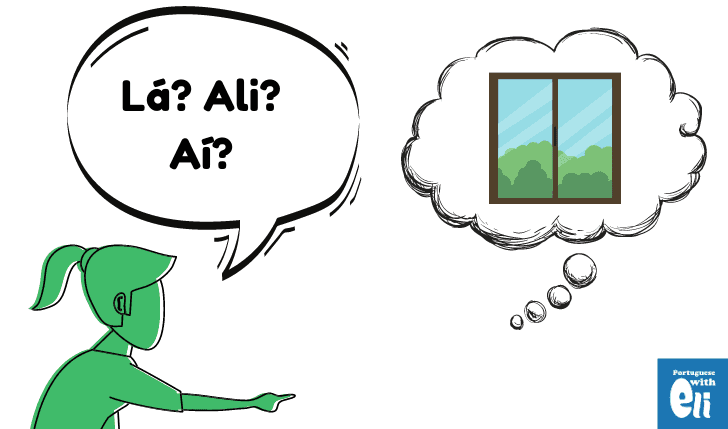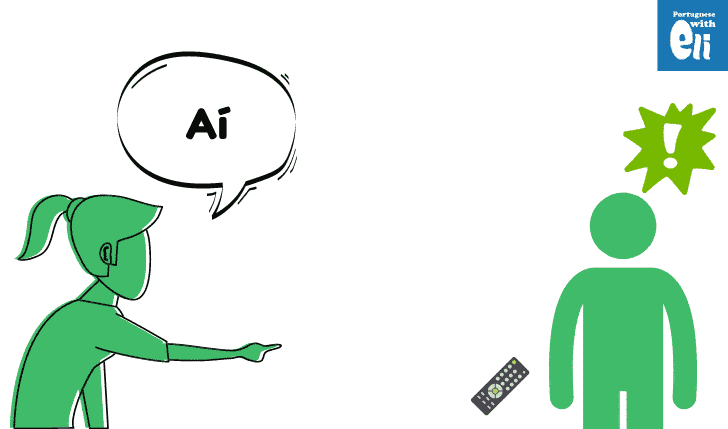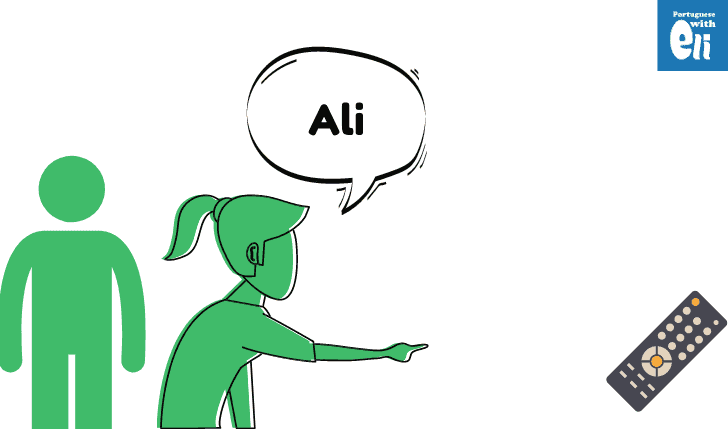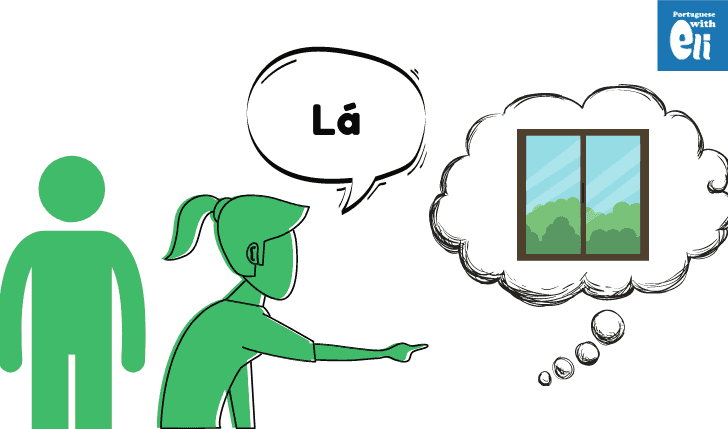Little-Known Secrets About Here And There in Portuguese

You’re at home. You’re sitting on the couch and want someone to get you the remote control that is on the table.
You then say, “can you get me the remote? It’s there on the table.”
And it’s instantly clear what you mean.
But how would you do that in Portuguese?
Would you say, “Ali na mesa?” “Lá na mesa?” “Aí na mesa?”
And the problem is, all three of them are right depending on the situation.
And after reading this short guide you’ll know for sure how to use all of them — here and there — in Portuguese… and then some.
But first, Aí vs Ali in Portuguese.
Before we dive deep into the usage of those words, I just want to get this out of the way.
If you speak Spanish — even if that’s not your native language — you might confuse the pronunciation of the words “aí” and “ali” in Portuguese.
This happens because Spanish has a word that looks like “ali” but sounds like “aí” — allí.
So, in Portuguese their pronunciation is different and so is their meaning.
Here’s how you would pronounce aí.
And here’s how you would pronounce ali.
Did you notice the L sound as in “Lala land”?
Don’t confuse that.
It’s going to spare you a lot of embarrassment.
And now, let’s take a look at the first word, aqui.
If you were Scooby Doo and you heard the song “where are you, Scooby Doo?” You might reply with:
- Estou aqui. I’m here.
And that’s the basic meaning of “aqui”.
You use it whenever you are talking about a concrete here.
You’ll understand in a moment why I say, “concrete”.
- Tem algum restaurante barato perto daqui?Is there any cheap restaurant near here?
- Você vem sempre aqui? Do you always come here?
- Vai lá, que eu vou ficar aqui esperando.You go ahead, I’m going to stay here waiting.
A little known-word Brazilians use but you won’t see on Duolingo is Cá.
And if you grew up in the 80s and the 90s — or if you have kids who grew up at that time — you may be familiar with the Mortal Kombat franchise.
(If you’re not, it means you’ve never seen a videogame, in which case you are forgiven.)
In that series there was a character called Scorpion. He could throw a kind of spear to catch his foes. When he got to snatch his victims, he would thrust them back saying, “Venha cá”.
Well, at least in Portuguese. In English he would say, “come here!”
And that the word “cá” means “here”, too.
But there is always a kind of movement from somewhere to here implied.
You can see it in the first example.
- Venha cá, seu moleque. O que você pensa que está fazendo?Come here, you pest. What do you think you’re doing?
- De lá para cá, são 50 km.From there to here it’s 50 km.
- Eu me mudei para cá em 1980. Pouca coisa mudou de lá para cá. I moved here in 1980. Not much changed from them on.
And in the third example you can see that “cá” is also being used with the meaning “to this time, to this day, to this moment”.
This is not a concrete “here” — and that’s where that piece of the aforementioned puzzle fits.
Here and there in Portuguese might give you the false impression that only two words existed. But as you saw, “here” has two words. And…
Now the big three — there, there, over there.
First, let’s get back to your living room.
I hope you have a TV. We need that for this example.
So, let’s say a friend came over for a visit.
She is sitting by the table close to the remote control.
And you are sitting on the couch watching TV.
You then turn to your friend and ask for the remote control.
“Você pode me dar esse controle aí?”
And the “aí” means “over there close to where the other person is but far from you”.

- Você pode me arranjar esse grampeador aí que está na sua mesa? Depois eu te devolvo. Can you hand me the stapler that is there on your table? Later on I’ll give it back.
- (ao telefone) Mãe, você pode ir naquela loja que fica perto aí da sua casa?On the phone — mom, can you go to that shop that is near your house there?
- O livro que você está procurando está bem aí no seu quarto. Se fosse uma cobra já tinha te matado.The book that you’re looking for is right there in your bedroom. If it were a snake it would have killed you already.
- O que é isso aí nas suas mãos?What’s that there in your hands?
And you see that most of the time we sandwich the words aí with esse, aquele, aquela…
You can think of it as an intensifier.
I’m not sure if you would say in English something like: “what’s that there in your hands?” But that sounds perfectly natural in Portuguese.
Second word — Ali.
Before we begin this one, please keep in mind that it overlaps with the next one, lá.
We’ll talk more about that in time.
Again, we’re back to your living room.
But this time you and your friend are sitting on the couch. And, there are three remote controls scattered around.
You ask your friend to get the remote control and she asks, “Qual?” (Which one).
And you point at the table that is far from both of you and you are close your friend, and you say, “Aquele controle ali na mesa.”
Again, notice the sandwiching.
And when you talk about something that is far from both you and your interlocutor (but this thing is at sight), you then use ali.

- Eu trabalhei ali naquela empresa por 20 anos.I worked at that company for twenty years.
- Você está vendo aquela mulher ali? Ela é minha esposa. Do you see that woman over there? She is my wife.
- Quem é aquele homem ali na porta da loja?Who is that man over there by the door of the shop?
And the last one, Lá.
This word is far more versatile then you might acknowledge.
I prepared this quick introduction to help you use this word as a Brazilian would.
But again, back to your living room.
Same as before, but this time the remote controls are not in the living room. None of them are at sight.
You ask your friend to go get the remote control and she asks, “Cadê ele?” (Where is it?).
And you say, “Está lá fora, no quintal.” (It’s there out in the back yard.).
Why it would be in the backyard beats me.
But the remote control is far from both you and your interlocutor and is not at sight.
In this case, we generally use “lá”.

- Eu saí da minha cidade quando tinha 15 anos e nunca voltei lá.I went away from my hometown when I was fifteen and I never went back there.
- Era uma casa muito bonita. Eu passei toda a minha infância lá.It was a very beautiful house. I spent my whole childhood there.
- Todo mundo ia lá para o interior nas férias. Lá era muito legal. Everyone went there to the country on the vacations. It was very cool there.
Sometimes “lá” is not necessary. When answering the question about the remote control, you might have just said:
“Está no quintal.”
And that would have been perfectly understandable. But it’s not really how we talk naturally.
If that were your answer it might convey some dissatisfaction or other kind of negative emotion.
A word you won’t see being taught but people speak in informal conversations is “Acolá”.
It is a bit like “lá”, but it is used to mean “beyond that place [that I’m pointing at now].”
It’s also used to mean “a distante place” as in the sentence: o que é que você foi fazer acolá?
“But… you said lá and ali overlap. How can I know when to use one or another?”
First, I try and provide as much context as I can for the examples. And they do it because context is essential when determining which one to use.
Without context, both sentences below are right.
Eu trabalhei lá. Eu trabalhei ali.
And now, imagine the following situation.
Your friend and you are walking back home. You see a strange dude standing a bit far from both of you. Then you ask:
- Quem é aquele homem ali? Ele não estava lá quando eu saí.
It’s not immediately obvious why “ali” became “lá” in the second sentence, but it’s a change that happens.
I have a theory and it begs for context — when she asked the question, she was looking at the man. When she added the comment (he was not there) she was looking at her friend.
But if she had said ali it would have been perfect.
So, do we have a hard-and-fast rule as to how to use here and there in Portuguese?
Almost.
And how can we improve our understanding of that?
Well, I suggest you take a look at the learning guides for the intermediate level podcasts that I produce.
They’re complete transcripts of spontaneous and natural vocabulary discussions about scenes of everyday life that Brazilians have.
You can get your first learning guide completely free by going here.
And if you have any questions, use the comments section below. I always try to answer questions as soon as I get them.
And for more grammar discussions, you can go to our content-full grammar page.



